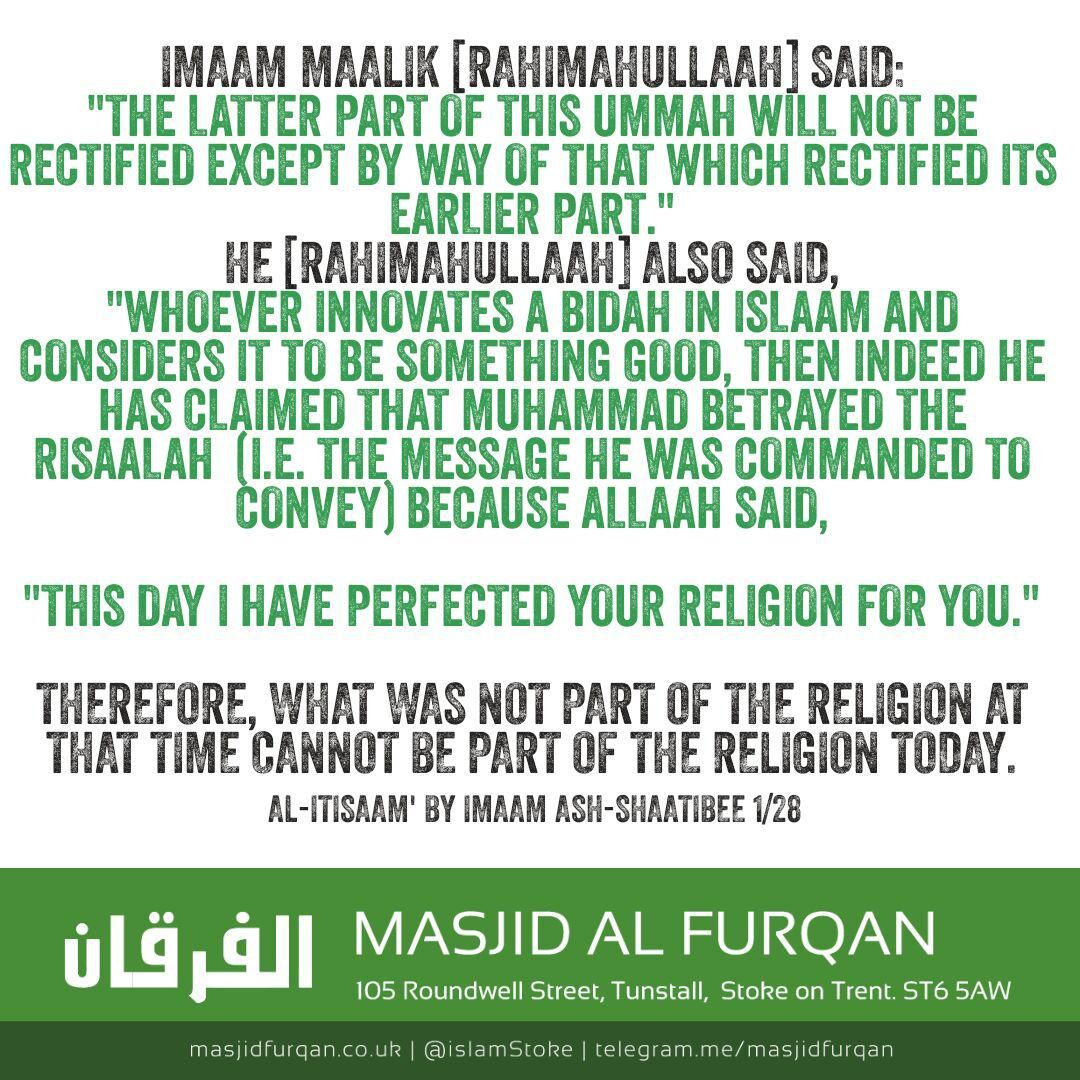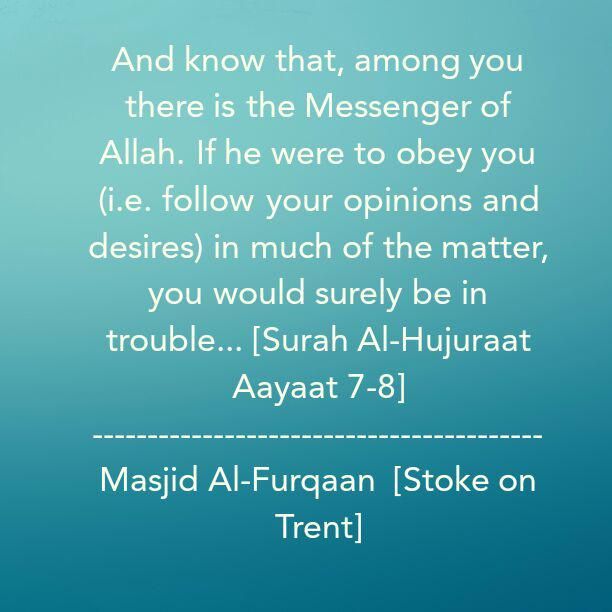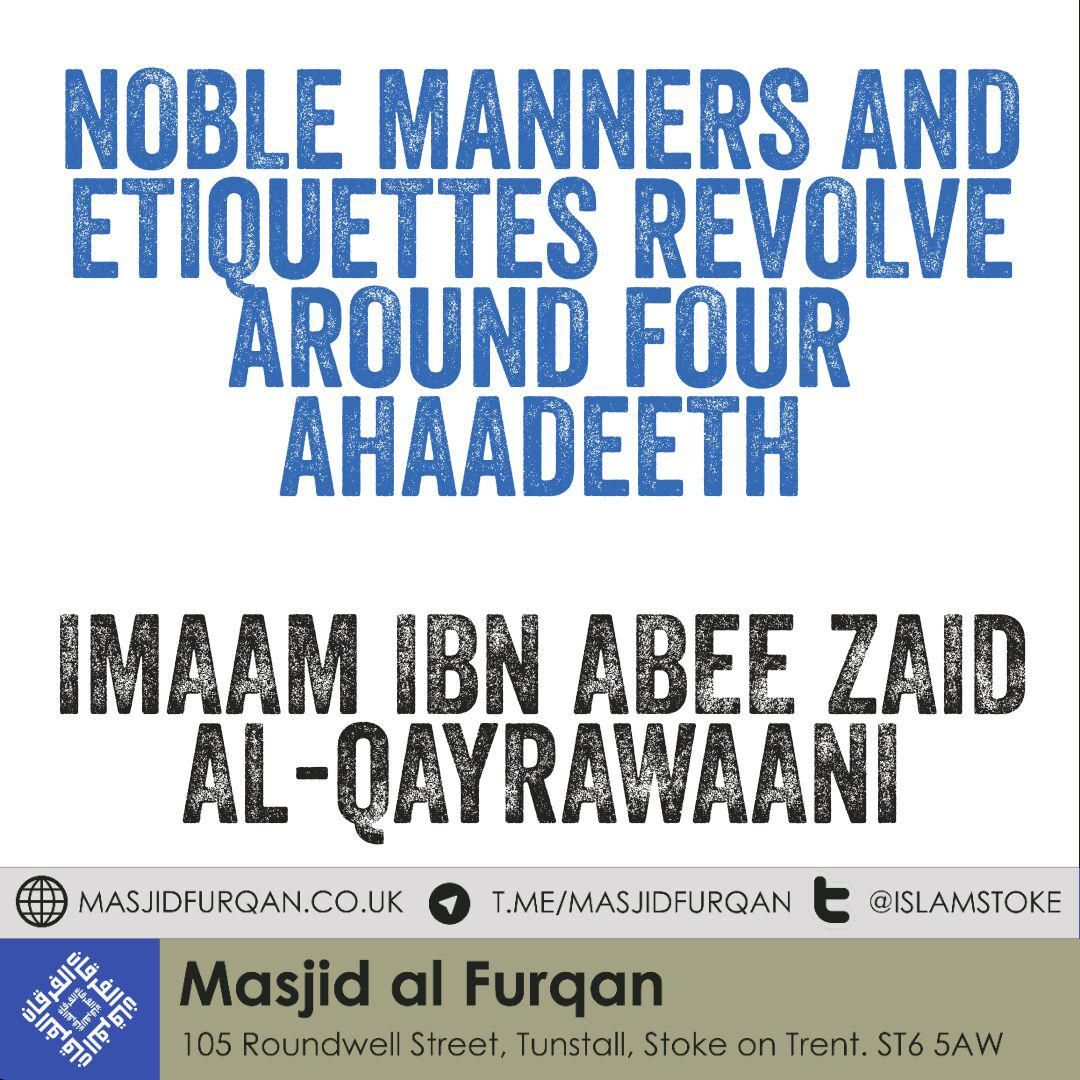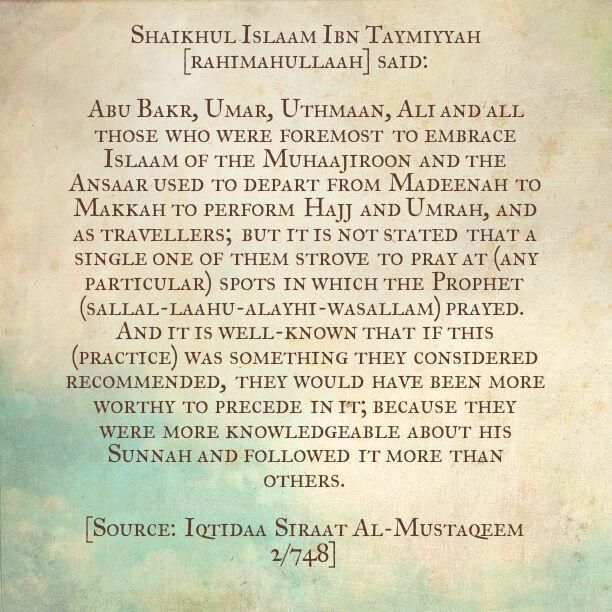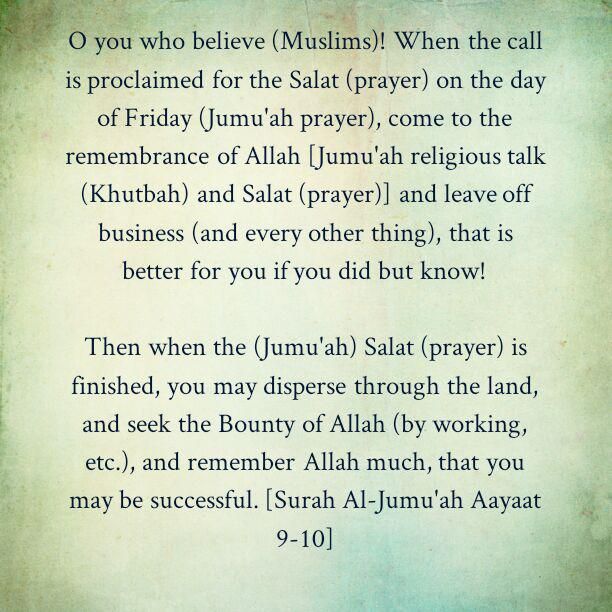Tag: ibaadah
AbuBakr and Umar [radiyallaahu-anhumaa] Used to Compete Each Other In Good Deeds
Written by Masjid Furqan on . Posted in Brotherhood, Morals and Manners - 'Akhlaaq', Purification of The Soul, The Salaf - Pious Predecessors, Worship - 'Ibaadah'.
In The Name of Allaah, The Most Merciful, The Bestower of Mercy
Imaam Ibnul Qayyim [rahimahullaah] said:
Every competitor compete the other and is happy when joined in it, just as the companions of the Messenger of Allaah [sallal-laahua-alayhi-wasallam] used to compete in good and they were pleased when others joined them; rather they used to encourage one another whilst competing. This is part of seeking to be foremost in [good deeds]. Allaah [The Most High] said: [ ۖ فَاسْتَبِقُوا الْخَيْرَاتِ-So hasten towards all that is good]. Allaah [The Most High] said:
[سَابِقُوا إِلَىٰ مَغْفِرَةٍ مِنْ رَبِّكُمْ وَجَنَّةٍ عَرْضُهَا كَعَرْضِ السَّمَاءِ وَالْأَرْضِ – Race one with another in hastening towards Forgiveness from your Lord (Allah), and towards Paradise, the width whereof is as the width of heaven and earth]. [57:21]
Umar Ibnul Khattaab [radiyallaahu-anhu] used to hasten towards [good deeds to compete] Abu-Bakr [radiyallaahu-anhu], but he never won. [Ref 1]
Umar [radiyallaahu-anahu] said: One day the Messenger of Allah [sallal-laahu-alayhi-wasallam] commanded us to give sadaqah. At that time I had some property, so I said: Today I shall surpass Abu-Bakr if I am to surpass him any day. So I brought half of my property. The Messenger of Allaah [sallal-laahu-alayhi-wasallam] said: What did you leave for your family? I replied: The same amount. Then Abu-Bakr brought all that he had with him. So the Messenger of Allah [sallal-laahu-alayhi-wasallam] said to him: What did you leave for your family? He replied: I left Allah and His Messenger for them. I [Umar] said: I shall never [excel you] in competing you in anything. [Ref 2]
[Ref 1: Source: Ar-Rooh of Imaam Ibnul Qayyim 431-432) abridged]
[Ref 2: Abu Dawood and graded Hasan by Sh Albaani’ Hadeeth Number: 1678’ kitaab Az-Zakaah (page: 259)]
A Healing For all The Diseases of The Heart
Written by Masjid Furqan on . Posted in Announcements, Purification of The Soul, Qur'aan, Scholars of Islam, Worship - 'Ibaadah'.
In The Name of Allaah, The Most Merciful, The Bestower of Mercy
Allaah [The Most High] said:
وَنُنَزِّلُ مِنَ ٱلۡقُرۡءَانِ مَا هُوَ شِفَآءٌ۬ وَرَحۡمَةٌ۬ لِّلۡمُؤۡمِنِينَۙ
And We send down from the Qur’an that which is a healing and a mercy to those who believe (in Islamic Monotheism and act on it). [Soorah Al-Israa: Ayah 82]
There are three statements [of the scholars] regarding the Qur’aan being a healing: [a] It is a healing for misguidance due to what it contains of guidance; [b] It is healing for illnesses due to what it contains of blessings; [c] It is healing due to its explanation and clarification of the obligatory duties and rulings of the religion. [1]
The Qur’aan is a healing for the hearts. It heals the diseases of ignorance, doubt and scepticism. Allaah [The Most High] has never revealed a cure that is neither more comprehensive and beneficial, nor greater and quicker in removing diseases than the Qur’aan. [2]
The Qur’aan contains a healing for all [diseases] of the heart, such the disease of Shubhah [i.e. an affair that is made to resemble truth but is falsehood in reality], ignorance, corrupt views, perversion and evil aims; for indeed the Qur’aan is gathered upon ‘Al-Ilm Al-Yaqeenee-i.e. Knowledge of Absolute Certainty’ by way of which every shubhah and affair of ignorance is removed. It contains an admonition and a reminder by way of which every desire that is in opposition to the command of Allaah is removed. It is a healing for the bodies from what is harmful to them and its illnesses. As for it being a Mercy, it is due to the means and paths it guides to. If the servant acts [upon those means and follows those paths], he [or she] will be successful, receive Mercy, an everlasting happiness, reward in this worldly life and everlasting reward in the Hereafter. [3]
It (i.e. the Qur’aan) combines healing for the diseases of the heart, such as doubt, hypocrisy and other than that. It is a healing for the bodies when utilised for ruqya, such as what took place in the story of the man who performed ruqya with Soorah Faatihah on a man who was stung [by a scorpion]…. [4]
References:
[1] Source: Zaadul Maseer Fee Ilm At-Tafseer of Ibnul Jawzi (rahimahullaah)—Tafseer Soorah al-Israa]
[2] Source: Al-Jawaab Al-Kaafee page 4
[3] Abridged and slightly paraphrased. [Source: For further details see Tayseer Al-Kareem Ar-Rahmaan Fee Tafseer Kalaam Al-Mannaan]
[4][Abridged and slightly paraphrased: Source: See ‘Adwaa Al-Bayaan–Tafseer Soorah Al-Israa: Ayah 82]
The One [i.e. Allaah] Who Made You Love Imaan is The Most knowledgeable Concerning What Benefits His Servants
Written by Masjid Furqan on . Posted in Belief - 'Aqeedah', Purification of The Soul, Qur'aan, Worship - 'Ibaadah'.
In The Name of Allaah, The Most Merciful, The Bestower of Mercy
Allaah [The Most High] said:
وَاعْلَمُوا أَنَّ فِيكُمْ رَسُولَ اللَّهِ لَوْ يُطِيعُكُمْ فِي كَثِيرٍ مِنَ الْأَمْرِ لَعَنِتُّمْ وَلَكِنَّ اللَّهَ حَبَّبَ إِلَيْكُمُ الْأِيمَانَ وَزَيَّنَهُ فِي قُلُوبِكُمْ وَكَرَّهَ إِلَيْكُمُ الْكُفْرَ وَالْفُسُوقَ وَالْعِصْيَانَ أُولَئِكَ هُمُ الرَّاشِدُونَ فَضْلاً مِنَ اللَّهِ وَنِعْمَةً وَاللَّهُ عَلِيمٌ حَكِيمٌ
And know that, among you there is the Messenger of Allah. If he were to obey you (i.e. follow your opinions and desires) in much of the matter, you would surely be in trouble, but Allah has endeared the Faith to you and has beautified it in your hearts, and has made disbelief, wickedness and disobedience (to Allah and His Messenger) hateful to you. These! They are the rightly guided ones, (This is) a Grace from Allah and His Favour. And Allah is All-Knowing, All-Wise. [Soorah al-Hujuraat: Ayah 7-8]
Your love for Imaan, desire for it and its beautification in your hearts is not from yourselves; rather it is Allaah who placed it in your hearts. He is the one who made it preferable and pleasing to you; therefore do not put yourself before Allaah’s Messenger- neither speak until he speaks nor act until he commands you. The one [i.e. Allaah] who made you love Imaan is the most knowledgeable concerning what is of benefit for His slaves than yourselves. And had it not been the Tawfeeq of Allaah upon you, your souls would not have submitted to Imaan.
[Madaarij As-Saalikeen 1/414—415. Abridged and slightly paraphrased]
Noble Manners and Etiquettes Revolve Around Four Ahaadeeth
Written by Masjid Furqan on . Posted in Morals and Manners - 'Akhlaaq', Purification of The Soul, Scholars of Islam, Worship - 'Ibaadah'.
In The Name of Allaah, The Most Merciful, The Bestower of Mercy
Ibn Abee Zayd Al-Qayrawaani [rahimahullaah] said: All noble manners and etiquettes revolve around four ahaadeeth.
The First Hadeeth: “Whoever believes in Allaah and the last day then let him speak good or keep silent”.
This Hadeeth teaches us about restraining the tongue from (evil, false, doubtful speech etc); for whoever is unable to restrain his tongue from (these blameworthy affairs) is not considered to be from the people of good manners.
The Second Hadeeth: “Part of the perfection of a person’s Islam is to leave that which does not concern him.”
This Hadeeth teaches us to refrain from engaging in excess and that which does not concern us. The person who concerns himself with those affairs of the people that do not concern him – either by listening, looking or speaking -is not considered to be from the people of good manners.
The Third Hadeeth: A man said to the Prophet (sallal-laahu-alayhi-wasalam) “Advise me.” He said, “Do not become angry.” The man repeated his request several times, and each time the Prophet said to him, “Do not become angry.”
This Hadeeth teaches us self-restraint when we are angry. That is because anger is the basis of every evil in speech and action. Whoever cannot restrain himself (or herself) from (evil) when he is angry cannot be considered to be from the people of good manners.
The Fourth Hadeeth: None of you truly believes until he loves for his brother what he loves for himself.
This Hadeeth is a means of rectifying the heart and soul, so that a person’s heart is free from harbouring malice, hatred, envy towards his Muslim brothers and sisters.
Conclusion:
If a person acquires a precise understanding of these four ahaadeeth and acts upon them, they have indeed acted on all the affairs related to good manners and etiquettes. These four Hadeeth comprise of four affairs:
Restraining the tongue from (evil, false, doubtful speech etc)
Restraining oneself from excess – be it by way of speech, looking, listening etc
Restraining oneself from evil desires and wishes during anger.
To have a heart free from unjustified hatred; blameworthy envy (i.e. wishing that blessings bestowed on others should cease) and malice etc
[Lesson15. Explanation of the forty Hadeeth of Imaam An-Nawawi’ (rahimahullaah) by Shaikh Abdur-Razzaaq Al-Badr (may Allaah preserve him). Paraphrased]
The One Who Abandons What is Beneficial For His [Or Her Religion] Will Face Trials- By Imaam As-Sadi
Written by Masjid Furqan on . Posted in Deviated Groups, Sects and Parties, Morals and Manners - 'Akhlaaq', Purification of The Soul, Qur'aan, Scholars of Islam.
In The Name of Allaah, The Most Merciful, the Bestower of Mercy
This is found in a number of Aayaat, that when the polytheists shunned the worship of Ar-Rahmaan [Allaah], they were put to trial through the worship of idols. And when they behaved haughtily and claimed that the Messengers were [only] humans [i.e. therefore they will not follow the Messengers], they were put to trial through submission to everything that made [their] intellects and Religion unstable.
And when Eemaan was clearly shown to them [i.e. the disbelieving nations] at the first instance and they recognised it, but then they turned away from it, Allaah [Glorified be He and free is He from all imperfections] averted, afflicted and sealed their hearts. So, they believed not until they saw the painful punishment.
And after the straight path was clarified for them, but they deviated from it by choice and approved the path of deviation in opposition to the path of guidance, Allaah deviated their hearts and caused them to be confounded in their path [of misguidance].
And when they belittled the signs of Allaah and His Messengers, Allaah belittled them with a humiliating punishment.
And when they behaved haughtily, Allaah humiliated them in this life and the next.
And when they forbade that Allaah’s Name be glorified and mentioned in the Mosques of Allaah and strive for their ruin, then it was not fitting after that they should enter it except in fear.
وَمِنْهُم مَّنْ عَاهَدَ اللَّـهَ لَئِنْ آتَانَا مِن فَضْلِهِ لَنَصَّدَّقَنَّ وَلَنَكُونَنَّ مِنَ الصَّالِحِينَ
فَلَمَّا آتَاهُم مِّن فَضْلِهِ بَخِلُوا بِهِ وَتَوَلَّوا وَّهُم مُّعْرِضُونَ
فَأَعْقَبَهُمْ نِفَاقًا فِي قُلُوبِهِمْ إِلَىٰ يَوْمِ يَلْقَوْنَهُ بِمَا أَخْلَفُوا اللَّـهَ مَا وَعَدُوهُ وَبِمَا كَانُوا يَكْذِبُونَ
And of them are some who made a covenant with Allaah (saying): ”If He bestowed on us of His Bounty, we will verily give Sadaqah (Zakat and voluntary charity in Allaah’s cause) and will be certainly among those who are righteous. ”Then when He gave them of His Bounty, they became niggardly [refused to pay the Sadaqah (Zakat or voluntary charity)], and turned away, averse. So He punished them by putting hypocrisy into their hearts till the Day whereon they shall meet him, because they broke that (covenant with Allaah) which they had promised to Him and because they used to tell lies”( 9:75-77)
The Aayaat that convey this affair are numerous and they show that the servant was close to being guided and made to follow the straight path, but then he abandoned it after knowing it, or he renounced it after following it, so he is punished and has no right to guidance. This is a recompense for his actions, as Allaah said about the Yahood [i.e. those who knew the truthfulness of Muhammad’s (sallal-laahu-alayhi-wasallam) Messengership, but turned away from it wilfully)]:
وَلَمَّا جَاءَهُمْ رَسُولٌ مِّنْ عِندِ اللَّـهِ مُصَدِّقٌ لِّمَا مَعَهُمْ نَبَذَ فَرِيقٌ مِّنَ الَّذِينَ أُوتُوا الْكِتَابَ كِتَابَ اللَّـهِ وَرَاءَ ظُهُورِهِمْ كَأَنَّهُمْ لَا يَعْلَمُونَ
وَاتَّبَعُوا مَا تَتْلُو الشَّيَاطِينُ عَلَىٰ مُلْكِ سُلَيْمَانَ
And when there came to them a Messenger from Allaah (i.e Muhammad) confirming what was with them, a party of those who were given the Scripture threw away the Book of Allaah behind their backs as if they did not know! They followed what the (devils) gave out (falsely of the magic) in the lifetime of Sulaymaan. 2:101-102
They abandoned the most sublime, the most beneficial and the truthful Book (i.e. the Qur’aan), so Allaah put them to trial and they followed the most debased, untruthful and harmful path. Those who wage war against Allaah and His Messenger abandon spending their wealth in obedience to Allaah, and (instead) spend it in obedience to shaytaan.
[Source: Al Qawaa-idul Hisaan Li-tafseer Al Qur’aan” by Imaam Abdur Rahmaan As-Sadi (rahimahullaah). Pages: 96-97. Abridged and slightly paraphrased]
One Can Never Follow The Example of Prophet More Than The Sahaabah, So Why Not Suffice With What Sufficed Them?!
Written by Abdullah Jallow on . Posted in Scholars of Islam, The Salaf - Pious Predecessors, Worship - 'Ibaadah'.
Shaikhul Islaam Ibn Taymiyyah [ahimahullaah] said:
Abu Bakr, Umar, Uthmaan, Ali and all those who were foremost to embrace Islaam of the Muhaajiroon and the Ansaar used to depart from Madeenah to Makkah to perform Hajj and Umrah, and as travellers; but it is not stated that a single one of them strove to pray at [any particular] spots in which the Prophet [sallal-laahu-alayhi-wasallam] prayed. And it is well known that if this [practice] was something they considered recommended, they would have been more worthy to precede in it; because they were more knowledgeable about his Sunnah and followed it more than others.
[Source: Iqtidaa Siraat Al-Mustaqeem 2/748]
Our Lord! Make us not a trial for those who have disbelieved….
Written by Masjid Furqan on . Posted in Purification of The Soul, Worship - 'Ibaadah'.
In The Name of Allaah, The Most Merciful, The Bestower of Mercy
رَبَّنَا لَا تَجْعَلْنَا فِتْنَةً لِّلَّذِينَ كَفَرُوا وَاغْفِرْ لَنَا رَبَّنَا ۖ إِنَّكَ أَنتَ الْعَزِيزُ الْحَكِيمُ
“Our Lord! Make us not a trial for those who have disbelieved, and forgive us, Our Lord! Verily, You, only You are the All-Mighty, the All-Wise.” [60:5]
Az-Zujaaj [rahimahullaah] said: The meaning of it is: Do not give them victory over us, so they think that they are upon truth and we are put to trial by way of that.
[Source: Ighaatha Al-Lahfaan 2/163]
If You Concentrate On Your Own Rectification, Whilst Enjoining Good and Forbidding Evil To The Best of Your Ability, You Will Not Be Harmed By Those Who Are Astray
Written by Masjid Furqan on . Posted in Methodology - 'Manhaj', Morals and Manners - 'Akhlaaq', Purification of The Soul, Qur'aan, Worship - 'Ibaadah'.
In The Name of Allaah, The Most Merciful, The Bestower of Mercy
Allaah [The Most High] said:
يَا أَيُّهَا الَّذِينَ آمَنُوا عَلَيْكُمْ أَنْفُسَكُمْ ۖ لَا يَضُرُّكُمْ مَنْ ضَلَّ إِذَا اهْتَدَيْتُمْ ۚ إِلَى اللَّهِ مَرْجِعُكُمْ جَمِيعًا فَيُنَبِّئُكُمْ بِمَا كُنْتُمْ تَعْمَلُونَ
O you who believe! Take care of your own selves. If you follow the right guidance no hurt can come to you from those who are in error. The return of you all is to Allah, then He will inform you about (all) that which you used to do. [5:105]
Allaah [The Most High] said:[ يَا أَيُّهَا الَّذِينَ آمَنُوا عَلَيْكُمْ أَنْفُسَكُمْ ۖ – O you who believe! Take care of your own selves]-Meaning: Strive to rectify and perfect your own souls, and keep them firm upon the straight path. That is because if you are righteous, you will not be harmed by the one deviated from the straight path; rather he only harms himself [or herself]. [However], this does not indicate that the servant [i.e. a Muslim] is not harmed if he abandons enjoining good and forbidding evil or becomes negligent of it, for indeed his guidance will not be complete except through fulfilling what is obligated on him [or her] with regard to enjoining good and forbidding evil. If he is [genuinely] unable to stop evil with his hand and his tongue, but rejects it in his heart, then indeed he will not be harmed by the misguidance of others. [Ref A]
[إِلَى اللَّهِ مَرْجِعُكُمْ جَمِيعًا – The return of you all is to Allah]-Meaning: Your final destination is the day of Judgement and your gathering will be in the presence of Allaah [The Most High]; [فَيُنَبِّئُكُمْ بِمَا كُنْتُمْ تَعْمَلُونَ -then He will inform you about (all) that which you used to do]- Meaning: [Your] good and evil [deeds]. [Re 1]
Ref A:
Enjoining Good and Forbidding Evil
Question to Imaam Abdul Azeez Bin Baaz [Rahimahullaah]:
Is enjoining Ma’ruf and forbidding Munkar, namely correcting the wrong by the hand, a right for all Muslims or is it just confined to those in authority and their deputies?
A: Correcting the wrong is a right for all Muslims according to their ability, because the Messenger (peace be upon him) said, “Anyone of you who sees Munkar (that which is unacceptable or disapproved of by Islamic law and Muslims of sound intellect), let them change it with their hand (by taking action); if they cannot, then with their tongue (by speaking out); and if they cannot, then with their heart (by hating it and feeling that it is wrong); and that is the weakest of Iman (faith).”(Muslim, Abu Dawood, Tirmidhi & others)
However, changing by the hand must be based on ability that will not result in greater corruption or evil. Man has the right to rectify matters with his hand (by taking action) in his home, with his children, wife, and servants; and a manager has the authority to make changes with the hand within the organization they are responsible for, in accordance with the instructions that were given to them. Otherwise, people should not change with their hand anything they are not authorized to change. If they do make changes in matters that they have no authority over, this will result in more evil and great corruption between them and the people and between the people and the state.
In this case they should make the change with their tongue (by speaking out). They may say: “O so andso! Fear Allah! That is not permissible. This is Haram (prohibited),” or: “That is Wajib (obligatory) on you,” and clarify it with Shar’iy (Islamic legal) evidence. This is what can be done by the tongue. As for changing matters with the hand, this should be done where one has authority, such as one’s home, with those under one’s responsibility, or those authorized by the ruler, such as organizations given permission and authority to enjoin Ma’ruf (that which is judged as good, beneficial, or fitting by Islamic law and Muslims of sound intellect). They should make changes in accordance to the degree of authority that has been given to them, in the way prescribed by the Shari’ah (Islamic law), without exceeding their jurisdiction. The same applies to the governor of a city; he should make changes with his hand, in accordance with the instructions he has. [Fataawaa Ibn Baaz 8/208. Salafitalk.net]
Ref 1:
[Source: (Tayseer Al-Kareem Ar-Rahmaan Fee Tafseer kalaam Al-Mannaan). Abridged and slightly paraphrased]
Hasten Towards The Jumu’ah Prayer For The Remembrance of Allaah!
Written by Masjid Furqan on . Posted in Worship - 'Ibaadah'.
In The Name of Allaah, The Most Merciful, The Bestower of Mercy
Allaah [The Most High] said:
يَا أَيُّهَا الَّذِينَ آمَنُوا إِذَا نُودِيَ لِلصَّلَاةِ مِنْ يَوْمِ الْجُمُعَةِ فَاسْعَوْا إِلَىٰ ذِكْرِ اللَّهِ وَذَرُوا الْبَيْعَ ۚ ذَٰلِكُمْ خَيْرٌ لَكُمْ إِنْ كُنْتُمْ تَعْلَمُونَ
فَإِذَا قُضِيَتِ الصَّلَاةُ فَانْتَشِرُوا فِي الْأَرْضِ وَابْتَغُوا مِنْ فَضْلِ اللَّهِ وَاذْكُرُوا اللَّهَ كَثِيرًا لَعَلَّكُمْ تُفْلِحُونَ
O you who believe (Muslims)! When the call is proclaimed for the Salat (prayer) on the day of Friday (Jumu’ah prayer), come to the remembrance of Allah [Jumu’ah religious talk (Khutbah) and Salat (prayer)] and leave off business (and every other thing), that is better for you if you did but know! Then when the (Jumu’ah) Salat (prayer) is finished, you may disperse through the land, and seek the Bounty of Allah (by working, etc.), and remember Allah much, that you may be successful. [Soorah Al-Jum’ah. Aayaat 9-10]
Few Reminders from the above Aayaat
Allaah [The Most High] commands His believing slaves to attend the Jumu’ah prayer and that they hasten towards it when the call for it is proclaimed. And ‘hastening’ towards it means to come to it- giving it importance and making it the most important [affair].
[وَذَرُوا الْبَيْعَ -Leave off business]-Meaning: Leave off business when the call for the prayer is proclaimed and perform it, for indeed [ذَٰلِكُمْ خَيْرٌ لَكُمْ – that is better for you] than preoccupying yourself with business and missing the obligatory prayer, which is from the most emphasised of obligations; [إِنْ كُنْتُمْ تَعْلَمُون – if you did but know!] that what Allaah has with Him [of reward] is better and more everlasting, and that the one who prefers the worldly life over the religious [commandments and prohibitions], then indeed he has [incurred] a real loss, whilst thinking that he has profited. This command to leave off business is during the time of the prayer.
[فَإِذَا قُضِيَتِ الصَّلَاةُ فَانْتَشِرُوا فِي الْأَرْضِ – Then when the (Jumu’ah) Salat (prayer) is finished, you may disperse through the land] to seek earnings and business (transactions)].
And when it is the case that preoccupation with business is most likely to make a [person] heedless of the remembrance of Allaah, Allaah commanded that He be remembered much, saying:
[وَاذْكُرُوا اللَّهَ كَثِيرًا – and remember Allah much]- Meaning: Whilst you’re standing, sitting and reclining;
[لَعَلَّكُمْ تُفْلِحُونَ – that you may be successful]; for indeed an increase in remembrance of Allaah is the greatest means to success.
Source: (Tayseer Al-Kareem Ar-Rahmaan Fee Tafseer Kalaam Al-Mannaan). Abridged and slightly paraphrased

